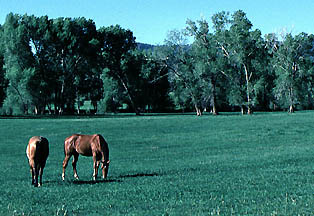UK’s Pasture Management Program Begins Third Year Serving Central Kentucky Horse Farms
UK’s Pasture Management Program Begins Third Year Serving Central Kentucky Horse Farms

The University of Kentucky’s Pasture Management Program, returning for its third year with significant enhancements, is now accepting applications from central Kentucky horse farms interested in a professional evaluation and detailed recommendations for their pastures.The Pasture Evaluation Program, which began in 2005 as a pilot program from UK’s Plant and Soil Sciences Department, provides area horse farms with a comprehensive assessment of their pastures. The assessment includes soil type and soil productivity, types and ratios of grasses and weeds present in each pasture, an estimation of forage (food) available, and a laboratory evaluation of endophyte, a fungus commonly found in tall fescue, and associated levels of ergovaline, a compound toxic to pregnant mares.Because of the overwhelmingly positive response generated during its first two years, this year’s program has expanded the services it provides to area farms. Enhancements for this year include increased acreage (up to an entire farm if requested), a fecal egg count, a grazing distribution map and follow-up measurements of ergovaline.Findings will then be presented in a customized and detailed report to each farm. That report will include a satellite photograph of the farm; explanation of soil type and recommended horse numbers per acre; overall percentage of all grasses found; information about how to interpret percent of endophyte and ergovaline levels; general guidelines for tall fescue removal, weed control and soil fertility; and information on grazing management, renovating pastures, re-establishing grasses and grass-legume pastures. The final report also contains more than 20 publications related to managing horses on pastures.This year’s program, which runs now through October, will provide services to horse farms in Fayette, Bourbon, Woodford, Scott, Jessamine and Clark counties. Also new this year is a limited participation of counties outside of those five central Bluegrass counties. Participation in the program is on a first-come, first-served basis, and the cost is $750. The team providing pasture evaluation includes Ray Smith, UK forage extension specialist, and Tom Keene, UK hay specialist.“The equine industry sorely needs the monitoring and consultation being provided with this service. It’s very gratifying to know that UK is addressing the issues that are important on horse farms in central Kentucky,” said Steve Johnson, former Kentucky Thoroughbred Farm Managers’ Club president and current president of Margaux Farm. Johnson was one of the participants in the program’s 2005 pilot phase. Since its launch, the program has evaluated 31 horse farms in central Kentucky.“The UK forage extension team has been extremely pleased with the success of the Horse Pasture Evaluation Program in 2005 and 2006,” Smith said. “We thoroughly enjoyed working with everyone on the farms who enrolled in the program and were very impressed with the professional animal care and handling that we observed on all farms. The majority of farms are to be commended for the good job they are doing in their pasture management programs.”From the 31 farms analyzed in the past two years, Smith noted some general areas where there was room for improvement. Those areas included the need for general weed control and the need to maintain sustainable horse-to-pasture ratios. Additionally, the percent of tall fescue on several farms was high enough to warrant control methods such as herbicide treatments or total replanting. Smith said he suspected those trends hold true for many of central Kentucky’s horse pastures and offers a few tips that will be useful to large horse farms as well as those that have only a few head of horses on a handful of acres. Those tips, which include steps in spring, fall and winter, are as follows:• Take soil samples. Work with your county extension agent to determine fertilizer requirements, and apply recommended lime and potassium and phosphorus fertilizer at any time of year. Nitrogen should be applied in late fall for cool-season grasses.• Avoid damaging pastures during the winter and early spring. Periodically move hay feeding areas and limit vehicle traffic on wet soils. Establishing a sacrifice paddock will also be helpful.• Prepare during the fall for spring seeding. Line up desired seed in advance (for instance, orchardgrass seed supplies are in short supply this year). Make sure seeding equipment is ready to go. Remember, late winter and early spring seeding is best for clovers, while fall seeding is best for cool-season grasses.• Control broadleaf weeds. Spray in early spring when weeds are actively growing but still small. Use recommended herbicides for your state (Kentucky’s recommendations can be found at http://www.uky.edu/AG/Forage). Be sure to review herbicide labels before reseeding to avoid residues.• Rotate horses between pastures. This will enhance stand recovery, interrupt parasite cycles, out compete weeds, and increase grass growth and carrying capacity.• Contact your county extension agent for assistance with all general agricultural questions.Farms interested in enrolling in this year’s Pasture Management Program should contact Keene at 859-257-3144, tom.keene@uky.edu, or Smith at 859-257-3358, raysmith1@uky.edu. The team will then make an initial visit to participating farms to explain program details. More information can also be found by visitinghttp://www.uky.edu/Ag/Forage.
